|
They came to Capernaum and, once inside the house, he began to ask them, “What were you arguing about on the way?” But they remained silent. They had been discussing among themselves on the way who was the greatest. Then he sat down, called the Twelve, and said to them, “If anyone wishes to be first, he shall be the last of all and the servant of all.” Taking a child he placed it in their midst, and putting his arms around it he said to them, “Whoever receives one child such as this in my name, receives me; and whoever receives me, receives not me but the One who sent me.” – Mark 9:33-37
Here, we have another classic example of Jesus’ disciples screwing up. I love them for that. In my struggle to figure out how I can better receive Christ, the knowledge that these great saints also constantly screwed up keeps me from spiritual perfectionism, and instead lets me focus on growth. In this particular case, the disciples failed to discern that concern for the welfare of others needed to trump their own ambition. In my circles of Catholic emerging adults, we talk a lot about discernment, and there is an ever-growing area within practical Catholic spirituality about how to practice discerning well. We discern marriage or religious vocation; we discern where to begin a job search; we discern whether even to begin that job search or go on for more education. We discern our roles within changing friendships. It’s so common that among my friends, discernment is even tossed around as a joke, such as when we “discern” whether we should order another pizza for the game watch party. However, what struck me in this Gospel passage is the fact that the disciples clearly had to practice something else before moving on to discernment. The prerequisite to discernment must be a well-formed conscience. The disciples had no idea what they should have been talking about along the road, but they were ashamed when Jesus asked what their conversation was – they knew, deep down, that who was the greatest among them certainly wasn’t a question worth their consideration. Was that gut feeling present when the conversation started? The Catechism of the Catholic Church §1779 explains the need for introspective vigilance, and quotes the advice of St. Augustine: It is important for every person to be sufficiently present to himself in order to hear and follow the voice of his conscience. This requirement of interiority is all the more necessary as life often distracts us from any reflection, self-examination, or introspection: “Return to your conscience, question it… Turn inward, brethren, and in everything you do, see God as your witness.” (Saint Augustine) If we are truly going to discern as often as we profess about matters great and small, we need to attend to this interiority. Prayerful discernment, or choosing between good things, is hard enough. It becomes much harder if you can’t see what is not of God and can’t rule that out immediately. Today is the memorial of Teresa of Avila, a great contemplative. She certainly believed that when you don’t distract yourself with things that aren’t worth filling your mind, that’s when you can hear God. In Teresa’s meditation on the Song of Songs, she warns her religious sisters against “false peace” with oneself - a “peace” that anesthetizes and atrophies the soul. She took the time to identify nine kinds of false peace, which can stymie our growth into the disciples that God created us to be and which Christ calls us to be. We are each like the disciples in this Gospel: imperfect, but called by Christ to recognize when we could have done better. When we recognize the wrong questions, we can begin to discern which are the right ones. The disciples didn’t remain at peace with their pride, and grew into some of the greatest servants of others. For myself, I pray that I can stay away from the false peace that would make me complacent with the children and adults whom I serve as a parish director of religious education. Lord, help me to receive You in them. Laura Berlage serves as Director of Religious Education for Incarnate Word Parish in the Archdiocese of St. Louis.
0 Comments
As emerging adults in the Catholic Church many times we are asked the question why are you Catholic? or why do you remain Catholic? Sometimes asked from friends who fell away and sometimes asked by others in the Church that are surprised to see you present and active. We, as a Center, would like to share with you, at the end of each month, why we are Catholic and where it is that we find joy in our faith.
“We are an Easter people and ‘Alleluia’ is our song!” -St. Augustine of Hippo I first heard this quote several years ago, but it wasn’t until recently that I began to understand it more fully. Some of you may be wondering why I am writing about Easter in October, but this is exactly my point! We arealways an Easter people, and we should constantly direct ourselves towards the joy of the Resurrection! Nothing orients one towards Easter quite like participating in RCIA. This year, for the first time, I am helping to prepare catechumens, candidates, and confirmandi for full initiation into the Church during the Easter Vigil mass. This group is distinct from other RCIA groups because it is composed entirely of college students, both graduate and undergraduate, who are studying at the Catholic University of America in Washington, D.C. Every Thursday night, the ten or twelve students come together to learn about the faith through catechetical sessions presented by a member of the theology faculty or one of the chaplains of the university. Some students come straight from rugby practice, others from study sessions in the library, and a few grad students sacrifice time away from their young families to join us. What brings them all together in the campus ministry lounge on Thursday nights is a nascent love for the Church and a deep desire for the grace imparted through her sacraments. To put it simply, even in October they are oriented towards the joy of Easter. The Second Vatican Council’s Pastoral Constitution on the Church in the Modern World (Gaudium et Spes) opens with the following words: The joys and the hopes, the griefs and the anxieties of the men of this age, especially those who are poor or in any way afflicted, these are the joys and hopes, the griefs and anxieties of the followers of Christ. Indeed, nothing genuinely human fails to raise an echo in their hearts. In the next few days, the Church celebrates not only the joy of “All Saints” and the hope of “All Souls,” but we also share in the sorrow of the families and communities whom the faithful departed have left behind. It is this sense of community that calls others into the fold. As members of the Church we are called to share in the burdens of our fellow man, but we do so with the recognition of what God-made-man has already done for us. However heavy our loads, we have hope in Christ who shouldered all of our burdens and sacrificed himself for our sins. We share the grief of others because Christ has shared in our grief; but we must also share the hope and joy that we have in Him . . . the same hope and joy that brings twelve college students together for an hour each week on a busy school night to reflect upon the beauty of our faith. Where do I find joy? In the catechumens who long for Easter – even in October! – and yearn to become members of our community of faith. Leave it to the neophytes in the faith to teach us something about Christian joy! Easter in October? I’m all for it! Brett Garland is a Collaborator with the Catholic Apostolate Center. This post was originally published by the Catholic Apostolate Center in October 2012 Growing up, I often balked at the uniqueness of my name. It was different and I could never find novelty license plates on vacation with my name on it. Although I secretly always appreciated being the only Monica in my class, I sometimes longed to have been named Katie or Laura or Emily, much like most of the girls in my class. At one point, I distinctly remembering yelling out in sheer desperation, “I HATE MY NAME!” because I was unable to procure sparkly pencils that said Monica. With time and maturity, though, I learned to really love my name because it was a part of me and because of the connection to Saint Monica, who has become a spiritual role model to me.
As a young student in my parochial grade school, there was never any doubt as to which saint I would dress up as on All Saints Day. I looked forward each year to wearing the long black dress and black head covering that I associated with my patroness, Saint Monica. At the time, all I knew about her was that she was the mother of Saint Augustine and that she prayed for his conversion, which eventually happened. While we don’t know as much about her as we do about her son, we do know that she was active in her community and Church. She also had a tumultuous relationship with her husband, Patritius, who was a pagan. Throughout their marriage, they struggled with how to raise their children in terms of religion and, it being the 4th century, Monica was unable to have her children baptized as Christians. She probably also didn’t spend much time worrying about finding her name on a pencil. Monica spent most of her life praying for the conversion of her beloved son, Augustine. As he made poor life decisions, Saint Monica worked even harder to help her son know God as she did. She made it her life goal to see him baptized, which eventually happened in the year 387. I am grateful to share my name with a strong, faith-filled woman who spent her time devoted to God and to her family. She has provided an example to me how to remain steadfast in your faith despite what is going on around you, both in your personal life and in the greater world. Saint Monica is an excellent example for those who chose married life as a vocation. Not every marriage is perfect, but it is in that imperfection that we require the support of our partner and, more importantly, we require support from God. Saint Monica took her role as a mother very seriously. She prayed for and wanted her children to know the love of God, as she had. And, in the case of her son Augustine, she did whatever it took, including some tough love at times, to help him find his path to Christ. As we celebrate Saint Monica’s feast day today, let us remember those Saint Monica’s in our life - people guiding our spiritual lives, praying for us along our way, and being there to support us as we discover who we are in the Church, and let us be grateful for the unique aspects of our lives and our personalities that makes us different and special. Monica Thom Konschnik serves as the Administrator for the Catholic Apostolate Center and the Pallottine Seminary at Green Hill. “I don’t want to grow anymore.” This cantankerous proclamation has lately become my state of being. It sums up my exhausted emotions as I finish a two year service program, study for my comprehensive exams, move back into my Mom’s house and struggle to land a job. In grumbling to my program director that Growing up is hard and I don’t want to do it, she shared with me a piece of wisdom: “You are never done growing and you are never done with being challenged. In the growing and in the challenge you come to a deeper knowing of God.” While still dealing with the overwhelming idea of constantly growing, I have come to find truth in these words. I realized that not only is growing up hard, but being Catholic calls me to this constant growth- this constant conversion of heart!
Being Catholic calls me to encounter the messiness of challenges, the hardship of changes, and the realization that I will always be growing until I am with God. St. Augustine in his Confessions writes of this conflicted desire to want the virtues of God, yet not ready to struggle with the realities of attaining them. St. Augustine shares, “Give me Chastity, just not yet.” This is how I feel. I want holiness…just not yet do I want to have to confront the realities to attain it. I want to know God… but not deal with the messiness. I want to be filled with the Holy Spirit… but I don’t want to face the growth that the Spirit leads me to. Margaret Silf, in her book The Other Side of Chaos, writes, “But we will also take the journey in faith—not the kind of faith that knows all the answers and has mapped out the right and proper path, but the faith that says simply, “I don’t know, but I trust.” She goes on to say, “It matters that you are willing to open your heart to a wider, fuller reality, one in which over time, or perhaps beyond time, you will know that ultimately every painful harrowing of your life’s field, and every anxious tending of new and tender growth, are leading to a harvest that you can’t begin to imagine.” I try to know all the answers and map out all the “right” paths. I don’t know if I want to open my heart wider to a fuller reality. I want a plan, a job, certainty, etc. I want anything that will keep me from feeling these anxious and unsettling emotions of transition and change. Yet, as my spiritual director would say, that is not of God. God is in the messiness; he is in the hardship of leaving a place I have called home for two years. He is in the humbling action of moving back into my Mom’s home. He is found in the rejection letters coming in from jobs. There is no room for God and the work of the Spirit when I decide I know best and try to plan my path. So here I am, left with no other choice than to sit in the messiness of transition and chaos. My wanting to be with God and to know God has brought me here and it is here that I continue to learn to trust that He is with me. It may take many years, or my entire life, to see how this time led me closer to His will and to understand the need for restlessness and messiness. But, there is no doubt that by encountering the messiness and seeking God in it, I am growing in a way that will enable me to become the apostle He is calling me to be! So encounter your messiness, lean into your hardships, and know wherever you are God can be found. Pam Tremblay is the Blog Editor for the Catholic Apostolate Center. It has been about a year since I told my students that I would not be returning as their Religion teacher. I decided that I was moving back to Los Angeles at the end of the school year. I wanted to be back with my family especially my mom and two young nieces. I was burned out from teaching. And perhaps most importantly-I wanted to travel and explore the world. I wanted to do and achieve great and glorious things. At 25 years old, I was incredibly restless with my life.
At the beginning of his Confessions, St. Augustine writes his most famous and oft-quoted line: “For You have made us for Yourself, and our hearts are restless until they rest in you.” Throughout the first ever spiritual autobiography, Augustine bares his soul for God and for generations of people to read and understand. As a young man and even probably as an old Bishop, Augustine was a restless man searching and struggling for salvation. He was lonely and frustrated. He sought material goods and earthly pleasures. Yet it was not until he accepted God-rested in God-that he found peace. As I began to plan my travels, I remained open to any opportunity that would come before me. All I knew was that I wanted to see as many diverse places as possible and I wanted to do as many exciting things as possible. Thus, I hiked the 42 km Inca trail over four days to see Machu Picchu. I prayed at the Western Wall and knelt at the site of the Crucifixion. I saw my beloved Notre Dame get demolished in the National Championship game. I toured the White House and became breathless at the site of the Oval Office. I went on a medical mission in India and volunteered in various villages. I fulfilled “bucket list” places to see such as the Taj Mahal, Petra, and the Pyramids. It was an incredible blessing to be able to see and experience all these places, meet interesting people, and create such lasting stories and memories. However, I did not find the peace that I was searching for in my journeys. I sought it, prayed for it, and longed for it. And yet, it was not there. Despite all the miles I flew and the cool photos I took with Instagram, my heart was not at rest. Or at least not the rest I was hoping for. Nevertheless, when I look back on this year off, I notice the times that I felt at most peace were the days I spent with my nieces, Stella and Lauren. Stella is 3 and is incredibly precocious; she speaks both Korean and English, lectures us on how to listen better, and sings beautifully. Lauren is 1 and there is nothing in the world like her smile and her laugh. It has given me such immense joy to be with them, hold them, play with them-a joy that surprised me and builds upon itself. Seeing these two girls grow up and being present to them in very ordinary ways has given me peace that all the extraordinary sights in the world could not. When she read Confessions, my mom commented that St. Augustine and I shared some traits in common. We both love public speaking. We both have strong mothers who worry about them. And we both have a “healthy” amount of “confidence”-to put it lightly. All I can hope is that I find the rest in God that he pursued and ultimately found. Tae Kang has his MA in Theology from The University of Notre Dame through the Echo Faith Formation Program and has worked both as a Lay Ecclesial Minister in a Parish and as a High School Religion Teacher. My love of you, God, is not some vague feeling; It is positive and certain. Your word struck into my heart, And from that moment I loved you. Besides this, all about me, Heaven and earth and all that they contain Proclaim that I should love you. But what do I love when I love you? Not material beauty of a temporal order; Not the brilliance of earthly light; Not the sweet melody of harmony and song; Not the fragrance of flowers, perfumes, and spices; Not manna or honey; And not limbs the body delights to embrace. It is not these that I love when I love my God. And yet, when I love him, It is true that I love a light of a certain kind, A voice, a perfume, a food, an embrace; But they are the kind that I love in my inner self, When my soul is bathed in light that is not bound by space; When it listens to sound that never dies away; When it breathes fragrance that is not borne away on the wind; When it tastes food that is never consumed by the eating; When it clings to an embrace from which It is not severed by fulfillment of desire. This is what I love when I love my God. ~St. Augustine’s Canticle of Love; Confessions 10, 6-8. Happy Valentines Day from all of us at the Catholic Apostolate Center! May the LOVE of God and the LOVE of our Faith continue to grow in each of us!
"For already at the beginning of their lives they pass on. The end of the present life is for them the beginning of glory. These then, whom Herod's cruelty tore as sucklings from their mothers' bosom, are justly hailed as "infant martyr flowers"; they were the Church's first blossoms, matured by the frost of persecution during the cold winter of unbelief." St. Augustine
Twinkling lights adorn front porches; snowflakes fall softly to the earth; jingle bells sound from every street corner; and children’s voices sing praise in memory of the Savior’s birth as Christmas comes bustling into our lives. And as I watch and listen, I’m reminded that there are many voices that won’t be joining that chorus, at least not audibly. Christmas is one of my favorite times of year, but it also brings much sadness along with it as I remember my little brother who once again will not be joining us to celebrate this joyous feast. This pain is manifested in a deep way as much joy is to be shared by many. I don’t always associate Christmas as a time to bear my cross and follow Christ; after all, this is a joyous occasion. It’s a time to celebrate Jesus’ birth, not to mourn his death. This year I can’t help but think of the cross as I find myself remembering the deep sorrow and loneliness of losing someone so dear to me. Questions flood my mind of why my little brother, so innocent and so little, had to suffer stillbirth and die. As I reflect on this experience of powerlessness, I am reminded of those mothers who two thousand years ago lost their sons as Herod viciously sought to destroy Jesus. During the Christmas Season, our Church has a beautiful tradition of honoring those early martyrs, the Holy Innocents. Just as my own parents were devastated at the loss of my brother, I know that these mothers and fathers, too, felt the almost unbearable sorrow and sense of helplessness of losing a child. This senseless loss is my cross, as I can imagine it is a struggle for anyone who has lost a loved one, and yet Jesus doesn’t leave me alone for long. Words of St. Augustine come rushing into my head, comforting me: “For almighty God…because he is supremely good, would never allow any evil whatsoever to exist in his works if he were not so all-powerful and good as to cause good to emerge from evil itself.”[1] Hope. Reassurance. The cycle of death and life revealed. And then I realize why Christmas is so dear to me. Christmas manifests the time to celebrate life and to remember that good is ever being born into this world. Through his Beloved Son, God lovingly demonstrates His desire for good to triumph. As St. Augustine reminded me, God not only desires good but God always brings good out of evil situations, even though we might not always recognize it. My mind is amazed as I ponder the mystery of the Incarnation. Gratitude fills my heart as I feel Christ with me a midst my joy and my sorrow. The beautiful gift of a child, of the God incarnate, sent to us to share in our life and to bring good out of evil in a truly personal way. Church bells ring; incense lifts gracefully to the heavens; angels proclaim Good News of great joy; the Body of Christ is broken and shared; and I know in my heart that my little brother lives. Amy Winkler serves as an Echo Faith Formation Apprentice in the Diocese of Camden, NJ [1] St. Augustine, Enchiridion, 3, 11; PL 40, 236 as cited in CCC #312. “God became man so that man might become God” ~St. Augustine, Sermo 13 de Tempore
I recently went to a Christmas open house at the home of my housemate’s parishioners. Like most events during our two years of service, heads turn when they see a group of four twenty-something year-olds enter the room where the median age is 60+. The questions start flying: “Who are you?” “Why are you here?” “You go to Notre Dame- did you watch the last game?” “Are you single?” “Have you met my grandson?” The one that always gets me is some form of, “…wait, you’re 23 and you want to be a practicing Catholic?” Many times, not wanting to get too deep too fast, I simply shrug and say “Yeah, I must be crazy but I love our faith.” This time, maybe due to the Christmas spirit in the air, I could not contain myself and I blurted out- “THE INCARNATION!” As the woman stared at me and my housemates continued the conversation, I was left thinking; how could someone not want to be Catholic when we have the doctrine of the Incarnation? How could I ever leave a faith where I am deeply loved, completely known, and have the ability to not only know God but bring about His Kingdom in the here and now? In just a few days at Christmas Mass we will hear the Word proclaimed and we will hear that this Word became flesh in the form of a babe. It is tempting for us to sit at Mass thinking of all the things we have going on that day: the food to cook, the family to visit, the last minute gift to buy for the cousin we forgot about. Yet, at Christmas Mass we are told of a most unique reality, that God became human! This is RADICAL. No faith outside of Christianity professes that God took on human form out of love to unite himself with his creation. The Pastoral Constitution on the Church in the Modern World writes that “by his incarnation the Son of God has united himself in some fashion with every human. He worked with human hands, he thought with a human mind, acted by a human choice, and loved with a human heart. Born of the Virgin Mary, he has truly been made one of us, like us in all things except sin” (Gaudium et spes §22) ‘ Because of the Incarnation, Christ knows us completely. He knows our pain, he knows how we feel, and he knows what it is like to endure the daily realities of being human. But the Incarnation goes beyond even this great gift. God, in becoming human, transforms human tasks that simply get us from point “A” to point “B,” to tasks that are doing the will of God and making God manifest. As St. Augustine puts it, "God became man so that man might become God". REJOICE this Christmas season for we are given the news that we can become God! In the humble birth of a babe, the Word became flesh and our lives were transformed! Live with the knowledge that you are deeply loved and act in such a way that God is made present- this is challenge the Incarnation gives to us. Let us accept this challenge and live our Catholic identity with great JOY knowing the truths that the doctrine of the Incarnation makes possible. Pam Tremblay is the Blog Editor for the Catholic Apostolate Center. As emerging adults in the Catholic Church many times we are asked the question why are you Catholic? or why do you remain Catholic? Sometimes asked from friends who fell away and sometimes asked by others in the Church that are surprised to see you present and active. We, as a Center, would like to share with you, at the end of each month, why we are Catholic and where it is that we find joy in our faith.
“We are an Easter people and ‘Alleluia’ is our song!” -St. Augustine of Hippo I first heard this quote several years ago, but it wasn’t until recently that I began to understand it more fully. Some of you may be wondering why I am writing about Easter in October, but this is exactly my point! We are always an Easter people, and we should constantly direct ourselves towards the joy of the Resurrection! Nothing orients one towards Easter quite like participating in RCIA. This year, for the first time, I am helping to prepare catechumens, candidates, and confirmandi for full initiation into the Church during the Easter Vigil mass. This group is distinct from other RCIA groups because it is composed entirely of college students, both graduate and undergraduate, who are studying at the Catholic University of America in Washington, D.C. Every Thursday night, the ten or twelve students come together to learn about the faith through catechetical sessions presented by a member of the theology faculty or one of the chaplains of the university. Some students come straight from rugby practice, others from study sessions in the library, and a few grad students sacrifice time away from their young families to join us. What brings them all together in the campus ministry lounge on Thursday nights is a nascent love for the Church and a deep desire for the grace imparted through her sacraments. To put it simply, even in October they are oriented towards the joy of Easter. The Second Vatican Council’s Pastoral Constitution on the Church in the Modern World (Gaudium et Spes) opens with the following words: The joys and the hopes, the griefs and the anxieties of the men of this age, especially those who are poor or in any way afflicted, these are the joys and hopes, the griefs and anxieties of the followers of Christ. Indeed, nothing genuinely human fails to raise an echo in their hearts. In the next few days, the Church celebrates not only the joy of “All Saints” and the hope of “All Souls,” but we also share in the sorrow of the families and communities whom the faithful departed have left behind. It is this sense of community that calls others into the fold. As members of the Church we are called to share in the burdens of our fellow man, but we do so with the recognition of what God-made-man has already done for us. However heavy our loads, we have hope in Christ who shouldered all of our burdens and sacrificed himself for our sins. We share the grief of others because Christ has shared in our grief; but we must also share the hope and joy that we have in Him . . . the same hope and joy that brings twelve college students together for an hour each week on a busy school night to reflect upon the beauty of our faith. Where do I find joy? In the catechumens who long for Easter – even in October! – and yearn to become members of our community of faith. Leave it to the neophytes in the faith to teach us something about Christian joy! Easter in October? I’m all for it! Brett Garland is the Program Development Coordinator for the Catholic Apostolate Center. |
Details
Archives
April 2024
Categories
All
|
About |
Media |
© COPYRIGHT 2024 | ALL RIGHTS RESERVED

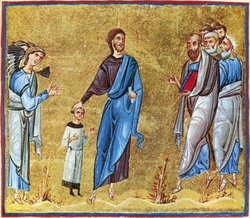

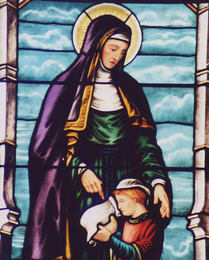


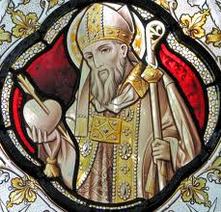
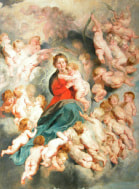
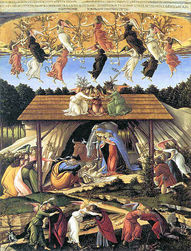
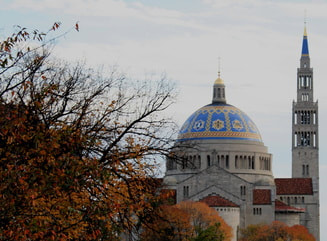
 RSS Feed
RSS Feed